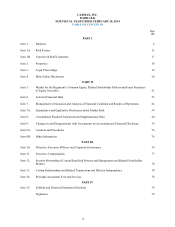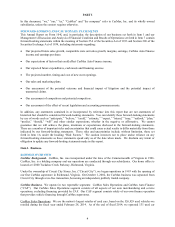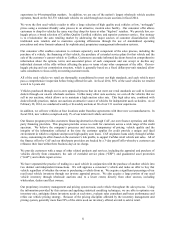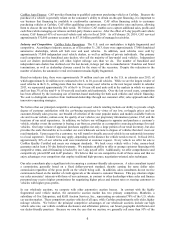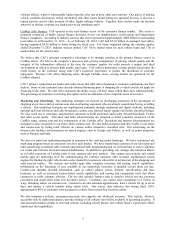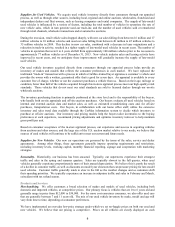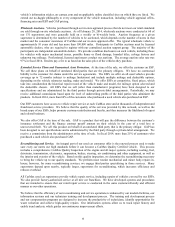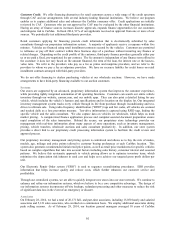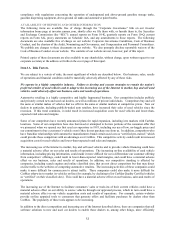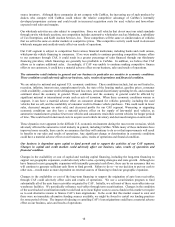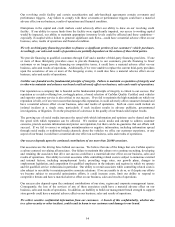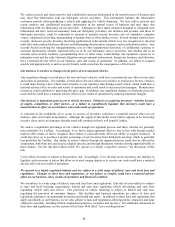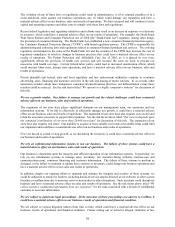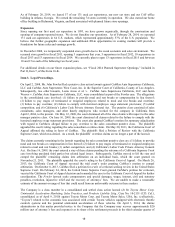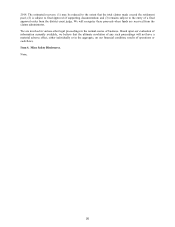CarMax 2014 Annual Report Download - page 17
Download and view the complete annual report
Please find page 17 of the 2014 CarMax annual report below. You can navigate through the pages in the report by either clicking on the pages listed below, or by using the keyword search tool below to find specific information within the annual report. 13
source inventory. Although these companies do not compete with CarMax, the increasing use of such products by
dealers who compete with CarMax could reduce the relative competitive advantage of CarMax’s internally
developed proprietary systems and could result in increased acquisition costs for used vehicles and lower-than-
expected retail sales and margins.
Our wholesale activities are also subject to competition. Since we sell vehicles that do not meet our retail standards
through on-site wholesale auctions, our competition includes automotive wholesalers such as Manheim, a subsidiary
of Cox Enterprises, and KAR Auction Services, Inc. These competitors sell the same or similar makes of vehicles
that we sell in the same or similar markets at competitive prices. This competitive activity could result in decreased
wholesale margins and could adversely affect our results of operations.
Our CAF segment is subject to competition from various financial institutions, including banks and credit unions,
which provide vehicle financing to consumers. If we were unable to continue providing competitive finance offers
to our customers through CAF, it could result in a greater percentage of sales financed through our third-party
financing providers, which financings are generally less profitable to CarMax. In addition, we believe that CAF
allows us to capture additional sales. Accordingly, if CAF was unable to continue making competitive finance
offers to our customers, it could have a material adverse effect on our business, sales and results of operations.
The automotive retail industry in general and our business in particular are sensitive to economic conditions.
These conditions could adversely affect our business, sales, results of operations and financial condition.
We are subject to national and regional U.S. economic conditions. These conditions include, but are not limited to,
recession, inflation, interest rates, unemployment levels, the state of the housing market, gasoline prices, consumer
credit availability, consumer credit delinquency and loss rates, personal discretionary spending levels, and consumer
sentiment about the economy in general. These conditions and the economy in general could be affected by
significant national or international events such as acts of terrorism. When these economic conditions worsen or
stagnate, it can have a material adverse effect on consumer demand for vehicles generally, including the used
vehicles that we sell, and the availability of consumer credit to finance vehicle purchases. This could result in lower
sales, decreased margins on units sold, and decreased profits for our CAF segment. Worsening or stagnating
economic conditions can also have a material adverse effect on the supply of late-model used vehicles, as
automotive manufacturers produce fewer new vehicles and consumers retain their current vehicles for longer periods
of time. This could result in increased costs to acquire used vehicle inventory and decreased margins on units sold.
These dynamics were apparent in the difficult U.S. economic environment during the most recent recession, which
adversely affected the automotive retail industry in general, including CarMax. While many of these indicators have
improved more recently, there can be no assurance that they will continue to do so or that improvements will result
in benefits to our sales and results of operations. Any significant change or deterioration in economic conditions
could have a material adverse effect on our business, sales, results of operations and financial condition.
Our business is dependent upon capital to fund growth and to support the activities of our CAF segment.
Changes in capital and credit markets could adversely affect our business, sales, results of operations and
financial condition.
Changes in the availability or cost of capital and working capital financing, including the long-term financing to
support our geographic expansion, could adversely affect sales, operating strategies and store growth. Although we
have financed recent geographic expansion with internally generated cash flows, there can be no assurance that we
will continue to generate sufficient cash flows to fund growth. Failure to do so—or our decision to put our cash to
other uses—would make us more dependent on external sources of financing to fund our geographic expansion.
Changes in the availability or cost of the long-term financing to support the origination of auto loan receivables
through CAF could adversely affect sales and results of operations. We use a securitization program to fund
substantially all of the auto loan receivables originated by CAF. Initially, we sell most of these receivables into our
warehouse facilities. We periodically refinance receivables through term securitizations. Changes in the condition
of the asset-backed securitization market could lead us to incur higher costs to access funds in this market or require
us to seek alternative means to finance CAF’s loan originations. In the event that this market ceased to exist and
there were no immediate alternative funding sources available, we might be forced to curtail our lending practices
for some period of time. The impact of reducing or curtailing CAF’s loan originations could have a material adverse
effect on our business, sales and results of operations.


